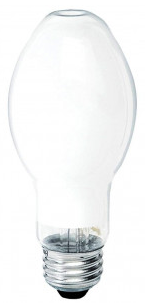 -- Links to mercury vapor bulbs by wattage at the end of this post. Sure, it's the age of LED lighting. Making the switch to LED makes a lot of sense both financially and in terms of maintenance long term. And it usually means an upgrade to the quality of lighting. But that doesn't mean everyone's ready to make that switch when it comes to upgrading from HID bulbs like mercury vapor bulbs. That's because the older technology often runs on ballasts that need to be bypassed and direct wired if an LED has a driver built in, or connected to a driver if the LED doesn't have one built in. Plus an LED bulb like a corn cob LED (the kind that would replace a mercury vapor bulb) is generally quite a lot more expensive up front. Sometimes a business is investing in other areas and needs to keep immediate lighting costs low for a time. Or they don't have someone available to make the new wiring connections. And that's where older technology like mercury vapor lighting still plays a role. (In some cases, mercury vapor bulbs have ballasts built in, much like LEDs that have drivers built in. In this case, the socket is already direct wired and you can simply swap the self-ballasted mercury vapor for a corn cob LED without having to bypass a ballast.) No one's going to give an award to mercury vapor bulbs for their quality of light. While they're able to render colors far better than low pressure sodium bulbs, they still tend to produce light with a greenish tint and render colors more poorly than most lighting technologies. The benefit they offer is efficiency -- they do produce many lumens per watt, offering a good value when combined with the low cost of a new bulb. (However, this should be coupled with the fact that you also need to pay for and replace ballasts from time to time if the bulb is not self-ballasted.) So you'll still see mercury vapor bulbs in settings that want to produce a lot of light at a relatively low cost where color rendering isn't critical -- parking lots and warehouses for example. And if you're looking for replacements for those lights, we carry plenty at the time of this writing. Of course the technology is waning as the world moves toward LED. But while we have them, you can find them by wattage through the links below, making your search an easy one: 50W Mercury Vapor Bulbs 75W Mercury Vapor Bulbs 100W Mercury Vapor Bulbs 175W Mercury Vapor Bulbs 250W Mercury Vapor Bulbs 400W Mercury Vapor Bulbs 1000W Mercury Vapor Bulbs
0 Comments
Your comment will be posted after it is approved.
Leave a Reply. |
This blog's content is copyright © 2014-19 Lighting Supply.
